Climbing Kilimanjaro Exclusive Packages
Climbing Kilimanjaro Packages by Routes
Mount Kilimanjaro Rongai Route
Rongai Route
Group Size: Based on Minimum of 2 passengers
Departs: Daily Private Departure
Uhuru Peak (5,895 meters / 19,341 feet): For those who conquer the highest point in Africa, a gold certificate awaits you as proof of your incredible feat.
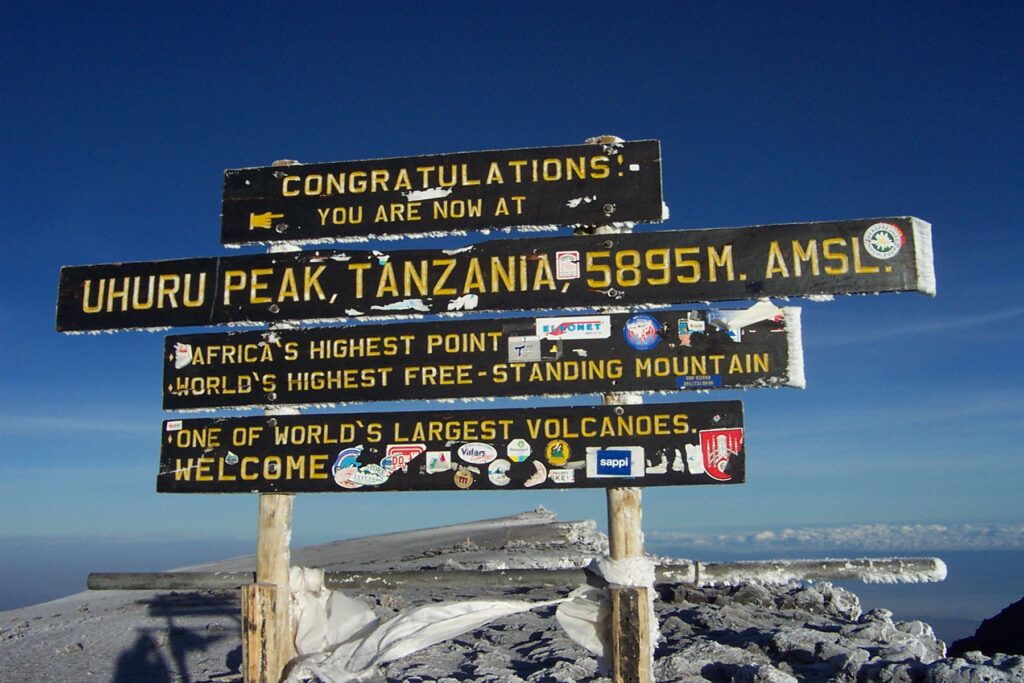
The Rongai Route is one of the most unique and rewarding paths to summit Mount Kilimanjaro, Africa’s highest peak. As the only route that approaches Kilimanjaro from the north, near the Kenyan border, it offers a remote and less crowded experience compared to other popular routes. Whether you’re a seasoned hiker or a beginner, the Rongai Route provides a gradual ascent, stunning wilderness views, and a high success rate, making it an excellent choice for your Kilimanjaro adventure.
We’ll cover everything you need to know about the Rongai Route, including its highlights, difficulty level, success rates, costs, and a detailed 7-day Rongai route itinerary.
1. Is the Rongai Route the easiest route on Kilimanjaro?
Yes, the Rongai Route is considered one of the easiest routes due to its gradual ascent. However, proper acclimatization and fitness are still essential.
2. How long is the Rongai Route?
The total trekking distance is approximately 79 km (49 miles) over 6-7 days.
3. What is the scenery like on the Rongai Route?
The route offers diverse landscapes, including rainforest, heathland, moorland, and alpine desert. While it may not be as scenic as the Machame or Lemosho routes, its remote wilderness is a major draw.
4. Can beginners climb the Rongai Route?
Yes, beginners with good fitness levels and proper preparation can successfully climb the Rongai Route.
Rongai Route Success Rates
The Rongai Route has a high success rate, especially for the 7-day trek:
7-Day Trek: 80-95% success rate (depending on the operator).
6-Day Trek: 65-75% success rate.
The longer itinerary allows for better acclimatization, making it the preferred choice for most climbers.
Best Time to Trek the Rongai Route
The Rongai Route is a year-round trail, but the best times to climb are:
Dry Seasons: January-March and June-October (clear skies and stable weather).
Rainy Seasons: April-May and November (Rongai’s northern location makes it drier than other routes).
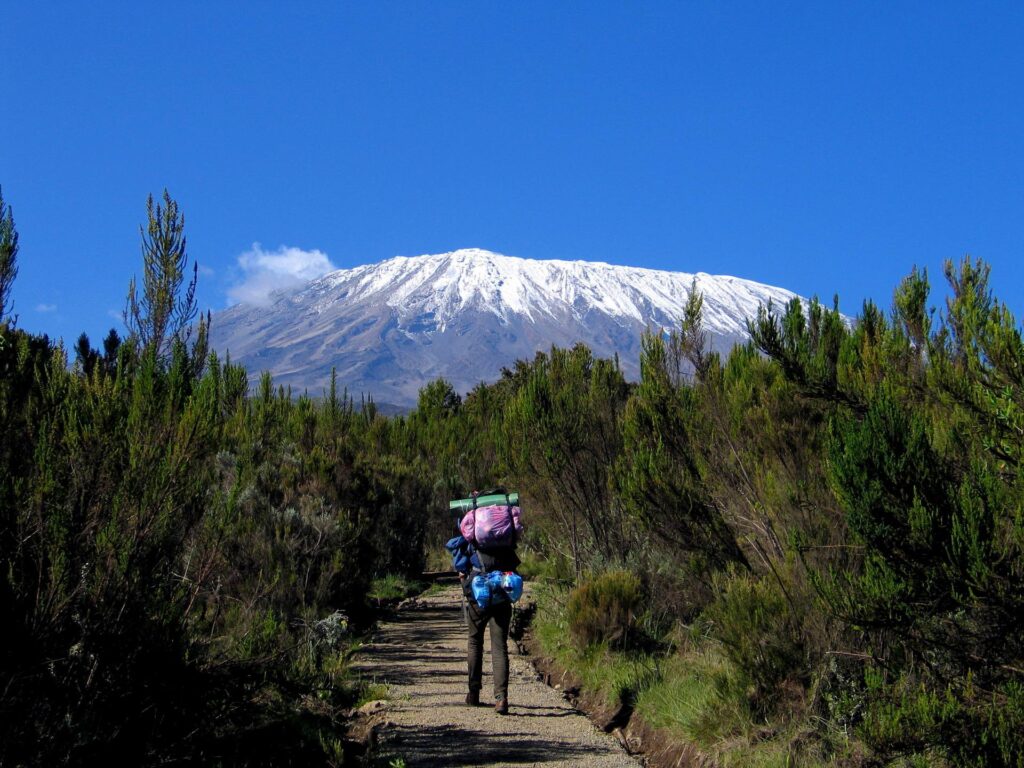
How Hard is the Rongai Route?
The Rongai Route is considered moderately difficult, making it suitable for beginners and experienced hikers alike. The gradual slope ensures a less strenuous climb, but the shorter duration of some itineraries (6 days) can increase the risk of altitude sickness. Opting for the 7-day or 8-day route significantly improves acclimatization and success rates.
How Much Does It Cost to Climb the Rongai Route?
The cost of climbing Kilimanjaro via the Rongai Route depends on the number of days and whether you choose a group or private climb. At Mount Kilimanjaro Guide, the current pricing for a 7-day private climb is $2,938 per person.
6 Days vs. 7 Days rongai Route: A Comparison
When deciding between a 6-day and 7-day itinerary, the key differences lie in acclimatization, cost, and overall experience. Here’s a comparison to help you decide which option suits you best:
Choose the 6-Day Route if:
You have prior high-altitude trekking experience.
You are confident in your physical fitness and ability to acclimatize quickly.
You are on a tighter budget or have limited time.
Choose the 7-Day Route if:
You are a first-time trekker or have limited high-altitude experience.
You want to maximize your chances of summiting successfully.
You prefer a more relaxed pace and want to enjoy the journey.
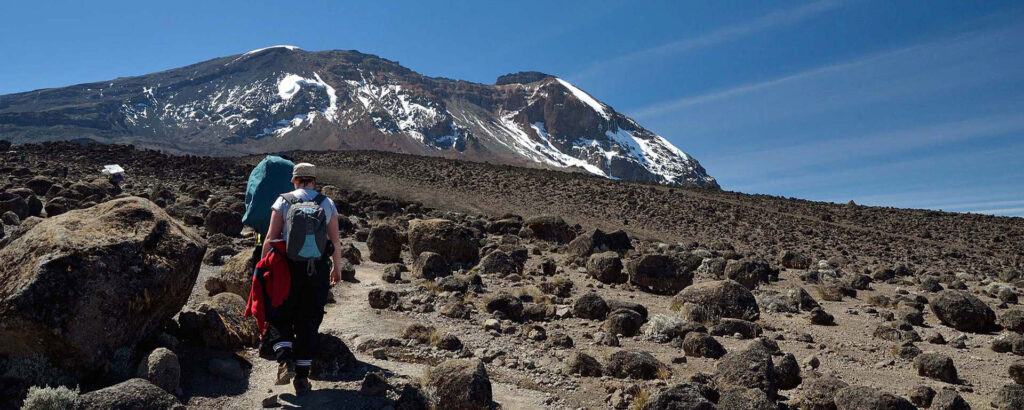
7-Day Rongai Route Itinerary Overview
The 7-Day Rongai Route is a popular and less crowded option for climbing Mount Kilimanjaro. It offers a unique wilderness experience, stunning scenery, and a high success rate due to its gradual ascent and longer duration. Below is a detailed breakdown of the 9-day climbing Kilimanjaro – Rongai Route in 7 days itinerary, including daily activities, park fees, pricing, and key considerations.
Day 1: Arrival at Kilimanjaro Airport
Activity: Transfer to the base hotel.
Details:
Arrive at Kilimanjaro International Airport and transfer to your base hotel in Moshi or Arusha.
Attend a briefing with your guide to discuss the climb, safety measures, and answer any questions.
Tip: Use this time to double-check your gear and ensure you have all necessary equipment for the climb.
Day 2: Rongai Gate to Simba Camp
Elevation: 1,950m (6,398ft) to 2,600m (8,530ft).
Distance: 8km (5 miles).
Hiking Time: 3-4 hours.
Habitat: Rainforest.
Details:
After breakfast, drive to Rongai Gate for registration and meet your guides and porters.
Begin the trek through lush rainforest, arriving at Simba Camp for overnight stay.
Tip: Stay hydrated and enjoy the rainforest scenery. Pace yourself to conserve energy.
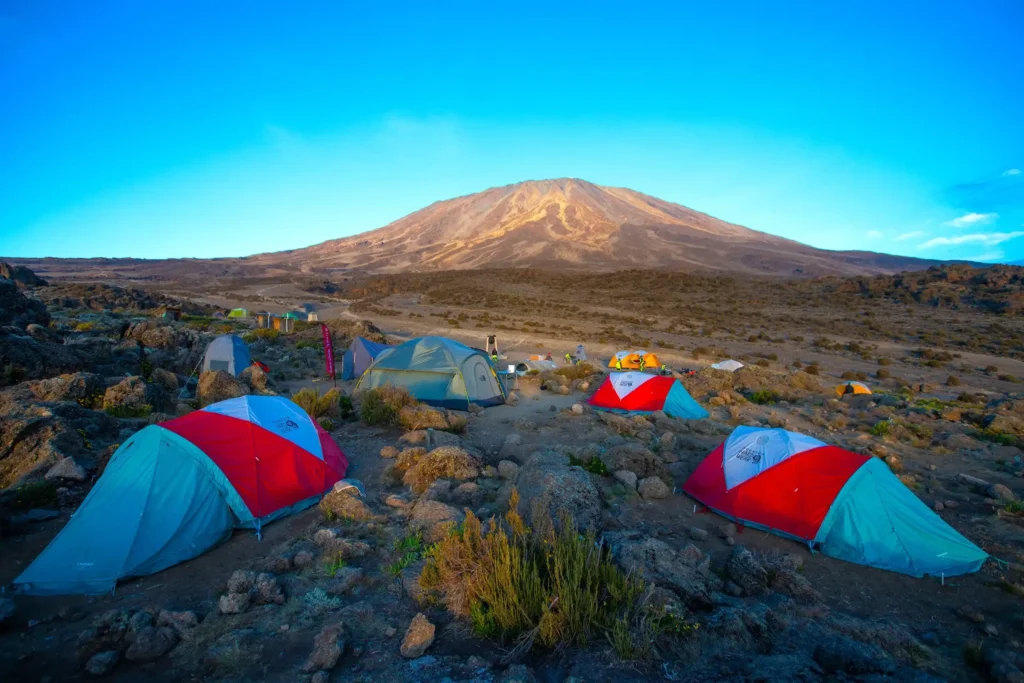
Day 3: Simba Camp to Kikelewa Camp
Elevation: 2,600m (8,530ft) to 3,600m (11,811ft).
Distance: 12km (7.5 miles).
Hiking Time: 6-7 hours.
Habitat: Moorland.
Details:
Trek through moorland with views of the Eastern ice fields.
Arrive at Kikelewa Camp for overnight stay.
Tip: Pay attention to your body’s response to altitude. Report any signs of altitude sickness to your guide immediately.
Day 4: Kikelewa Camp to Mawenzi Tarn Camp
Elevation: 3,600m (11,811ft) to 4,330m (14,206ft).
Distance: 6km (3.7 miles).
Hiking Time: 4-5 hours.
Habitat: Alpine Desert.
Details:
Trek to Mawenzi Tarn Camp, located in a cirque beneath Mawenzi Peak.
Take an acclimatization walk in the afternoon.
Tip: Use this day to acclimatize properly. Drink plenty of water and rest for the challenging days ahead.
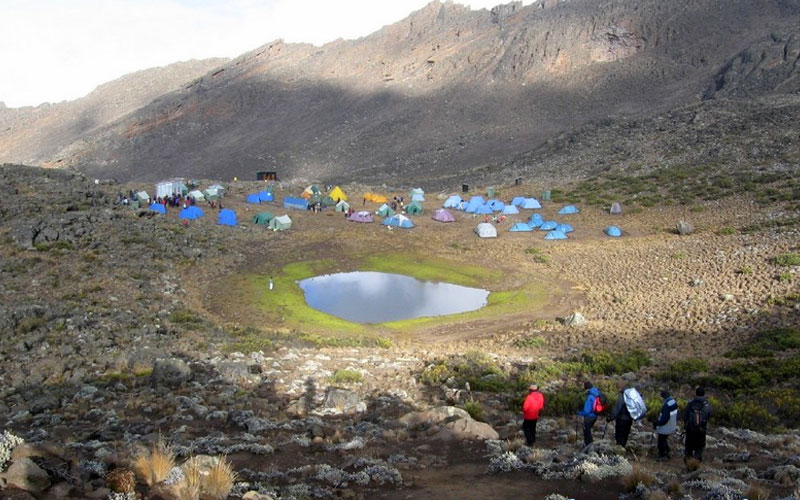
Day 5: Acclimatization Day at Mawenzi Tarn Camp
Activity: Acclimatization hike.
Details:
Spend the day acclimatizing with a guided hike around Mawenzi Tarn.
Rest and prepare for the summit push.
Tip: Take advantage of the shorter hiking day to rest and prepare for the summit attempt.
Day 6: Mawenzi Tarn Camp to Kibo Camp
Elevation: 4,330m (14,206ft) to 4,700m (15,420ft).
Distance: 9km (5.6 miles).
Hiking Time: 5-6 hours.
Habitat: Alpine Desert.
Details:
Trek across the Saddle to Kibo Camp, the base camp for the summit push.
Rest and prepare for the midnight summit push.
Tip: Eat well and stay hydrated. Sleep early to prepare for the long night ahead.
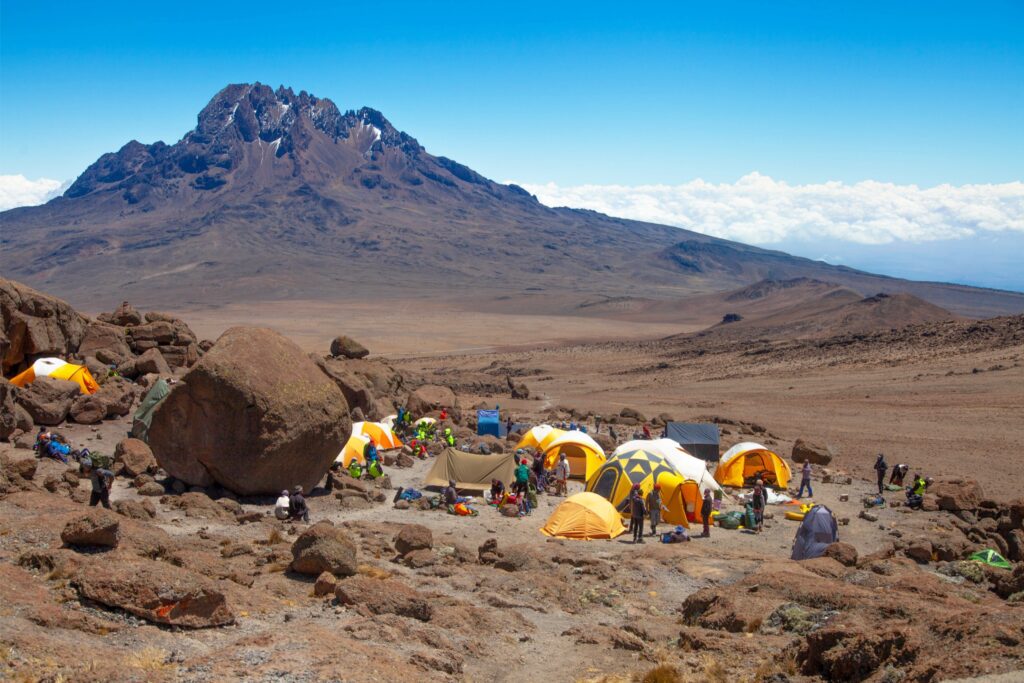
Day 7: Summit Day (Kibo Camp to Uhuru Peak and Descent to Horombo Camp)
Elevation: 4,700m (15,420ft) to 5,895m (19,341ft) and down to 3,706m (12,159ft).
Distance: 22km (13.7 miles) round trip.
Hiking Time: 12-16 hours.
Habitat: Arctic Zone.
Details:
Begin the summit attempt at midnight, trekking steep scree slopes to Gilman’s Point (5,685m / 18,650ft) on the crater rim.
Continue to Uhuru Peak (5,895m / 19,341ft), the highest point in Africa.
Descend to Kibo Camp for a short rest, then continue to Horombo Camp for the night.
Tip: Dress warmly in layers for the summit attempt. Take small, steady steps and follow your guide’s pace.
Day 8: Horombo Camp to Marangu Gate
Elevation: 3,706m (12,159ft) to 1,843m (6,046ft).
Distance: 20km (12.4 miles).
Hiking Time: 5-7 hours.
Habitat: Rainforest.
Details:
Descend through montane forest to Marangu Gate.
Receive your summit certificate (for those who reached Gilman’s Point or Uhuru Peak).
Transfer back to the base hotel for a hot shower and celebratory dinner.
Tip: Celebrate your achievement and rest after the strenuous climb.
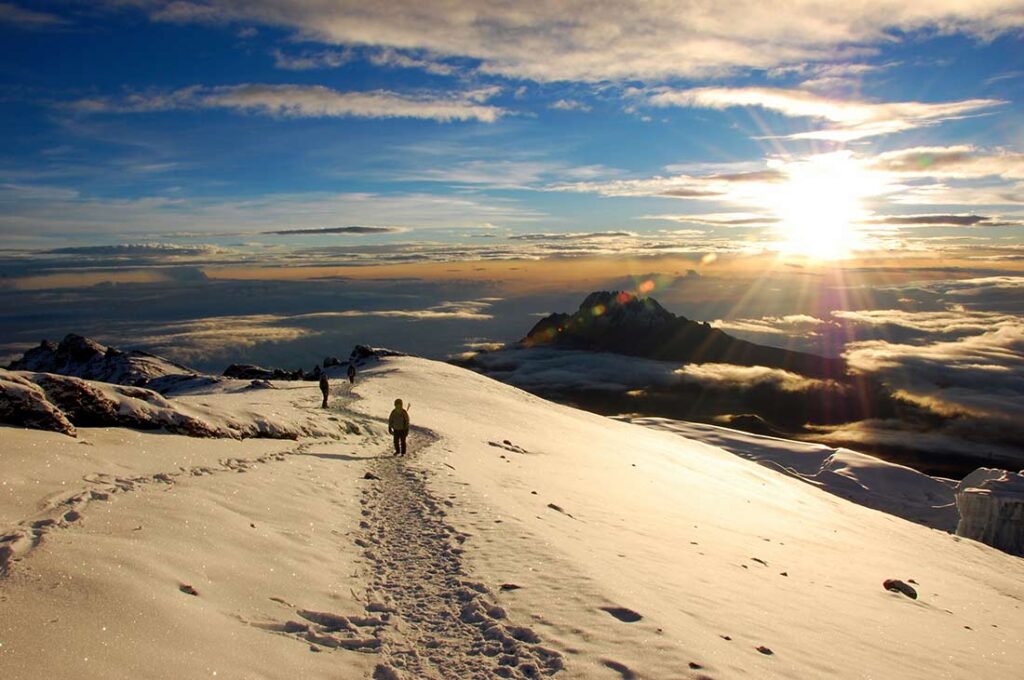
Day 9: Departure
Activity: Transfer to Kilimanjaro International Airport.
Details:
After breakfast, transfer to Kilimanjaro International Airport for your onward journey.
Tip: Ensure you have all your belongings and travel documents ready for departure.
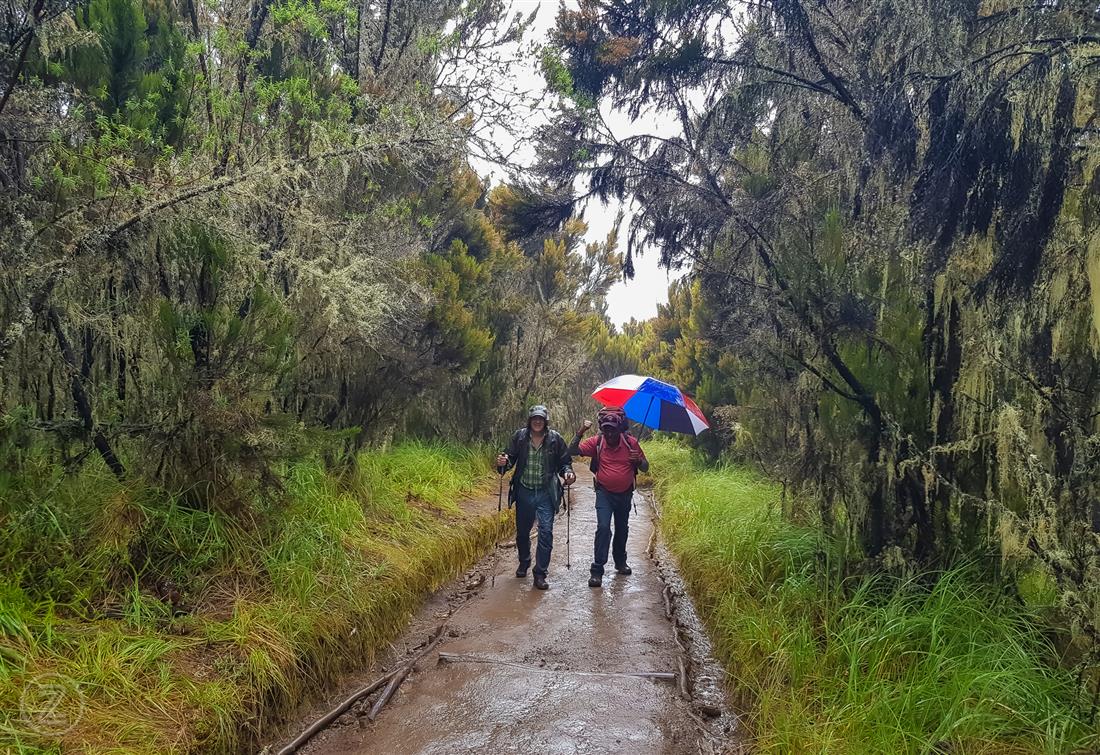
9 Days Climbing Kilimanjaro – Rongai Route in 7 Days: Prices and Services
If you’re planning to climb Mount Kilimanjaro via the Rongai Route, you’re in for an unforgettable adventure. This guide provides a detailed breakdown of the 7-day Rongai Route itinerary, along with pricing and services offered by Mount Kilimanjaro Guide
| Group Size | Price Per Person | Details |
|---|---|---|
| 1 person | USD 2,938 | Solo climbers pay a premium for private tours. |
| 2-4 people | USD 2,513 | Small groups benefit from shared costs (e.g., guides, porters, equipment). |
| 5-9 people | USD 2,313 | Medium-sized groups enjoy further discounts. |
| 10 & above | USD 2,050 | Large groups receive the best per-person rates. |
What’s Included in the Price?
Meals: 9 breakfasts, 8 lunches, and 9 dinners.
Accommodation: 2 nights in a 3-star hotel in Arusha and 7 nights of fully supported camping on a twin-share basis.
Group Camping Equipment: Tents (sleeping bags and mats not included – can be hired locally).
Guides and Porters: Experienced local mountain guides, cooks, and camp crew, as well as porters to carry personal and group equipment.
Safety Equipment: Emergency oxygen.
Transportation: Transfers between the airport, hotel, and Rongai Gate.
What’s Not Included?
Flights: International or domestic flights to/from Kilimanjaro.
Arrival/Departure Transfers: Transfers in Arusha.
Sleeping Bags and Mats: Can be hired locally.
Beverages: Aerated and alcoholic drinks.
Personal Expenses: Phone calls, laundry, etc.
Tips: For guides, porters, and camp crew.
Airport and Departure Taxes: Any applicable taxes.
Visa: Tanzania tourist visa (approximately USD 50-100, depending on nationality).
Travel Insurance: Mandatory for emergency medical and evacuation coverage.
Meals Not Mentioned: Meals not included in the itinerary.

